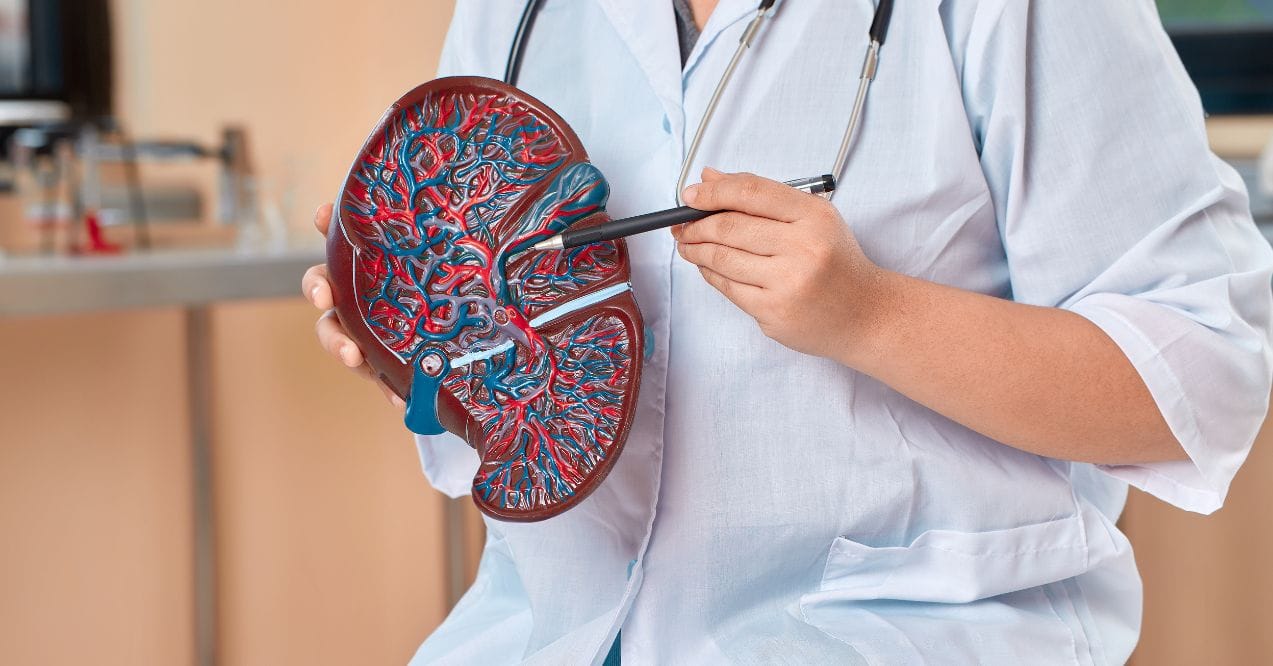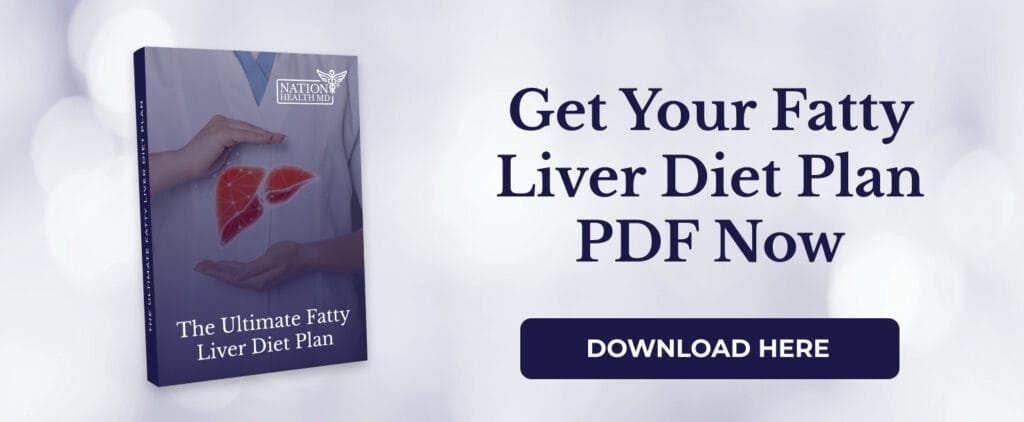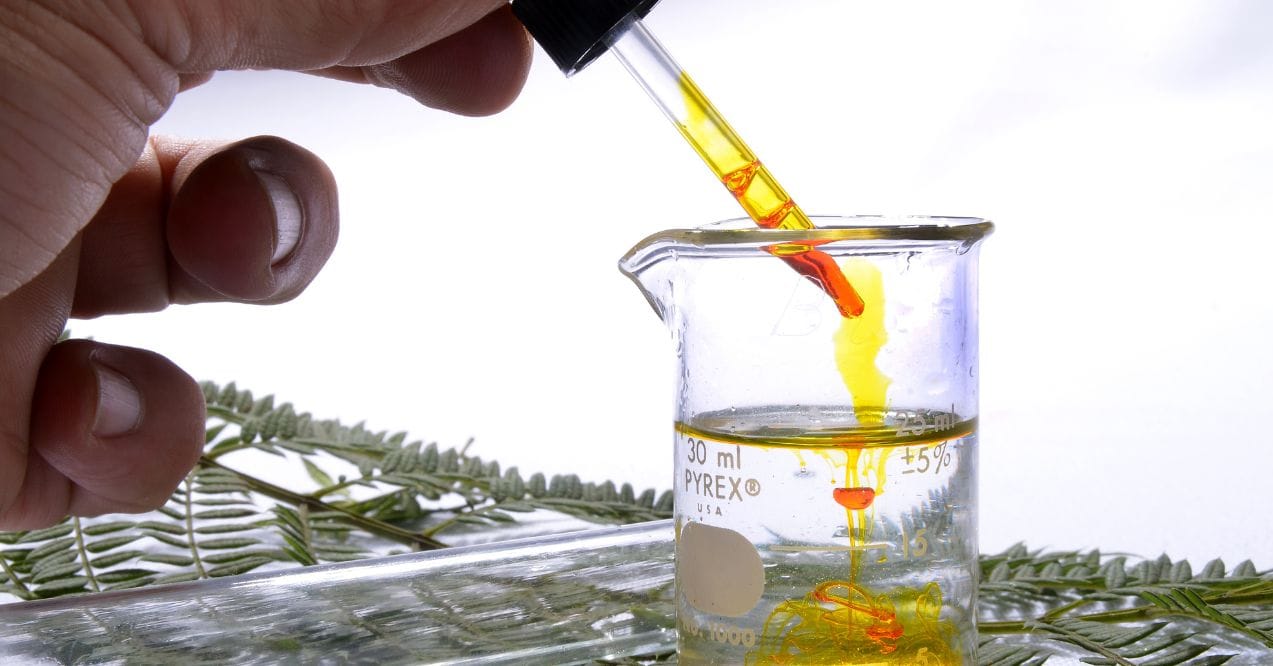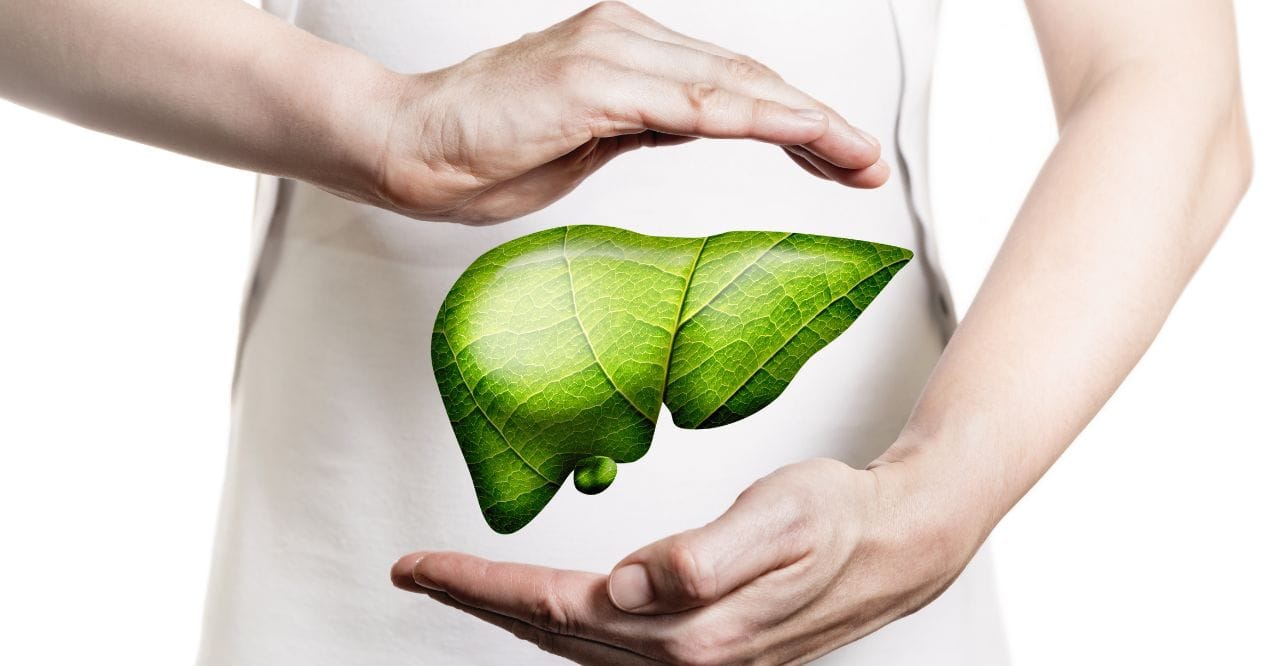The Ultimate Fatty Liver Diet Plan (Free PDF Download)
Medically reviewed by our experts


Living with a fatty liver can feel overwhelming, but positive dietary changes can make a real difference in your liver health. When excess fat builds up in your liver cells, it can affect how well this vital organ functions.
The good news? Research shows that mindful eating habits can support liver function and promote overall wellness. Our comprehensive fatty liver diet plan PDF guides you through practical, sustainable dietary changes that can help reduce liver fat accumulation. Ready to support your liver health through better nutrition?

What is Fatty Liver Disease?
Your liver is a remarkable organ that helps break down food, store energy, and remove harmful substances from your body. Fatty liver develops when excess fat builds up in your liver cells, affecting how well this vital organ functions. This condition can progress over time if not addressed through lifestyle modifications, particularly dietary changes.
There are two main types of this condition:
- Non-Alcoholic Fatty Liver Disease (NAFLD) – Caused by diet, lifestyle, and metabolic factors rather than alcohol consumption.
- Alcoholic Fatty Liver Disease (AFLD) – Develops excessive alcohol consumption, which affects the liver’s ability to process fats efficiently.
It’s important to note that liver enzymes provide important clues about how well your liver is functioning. When your liver is under stress, it releases more enzymes into your blood. What happens when your liver enzymes are high? This can be a sign that your liver is working harder than usual. Monitoring these levels can help you make informed choices about your diet and lifestyle to better support liver health.
How Diet Affects Fatty Liver Disease
What you eat plays a vital role in managing fatty liver disease. Your liver processes everything you consume, and certain foods can either support or challenge its function. Understanding this connection helps you make informed decisions while following a diet for fatty liver disease PDF.

Foods to Include in a Fatty Liver Diet Plan
A liver-friendly diet includes a variety of nutritious foods that support your liver’s natural functions. Knowing which foods to include in your diet for fatty liver PDF plan can help you make better daily choices.
| Food Category | Example | Benefits |
| Leafy Greens | Spinach, Kale, Swiss Chard | Rich in fiber and antioxidants that support liver function |
| Fatty Fish | Salmon, Sardines, Mackerel | Provides beneficial fats that support cellular health |
| Whole Grains | Quinoa, Brown Rice, Oats | Offers steady energy and essential fiber |
| Fresh Fruits | Berries, Apples, Citrus | Contains antioxidants that promote liver health |
| Vegetables | Broccoli, Brussels Sprouts, Garlic | Provides nutrients that help maintain liver health |
Foods to Avoid for a Healthier Liver
When following a fatty liver diet PDF, knowing which foods to limit is just as important as knowing which ones to include.
| Food Category | Example | Reason to Avoid |
| Processed Foods | Packaged Snacks, Ready Meals | Contains additives that make your liver work harder |
| Sugar | Sodas, Candies, Pastries | Can contribute to fat accumulation in liver cells |
| Fried Foods | French Fries, Fried Meats | May increase strain on liver function |
| Salty Snacks | Chips, Crackers, Pretzels | Can affect fluid balance in your body |
Key Principles of a Fatty Liver Diet
Following a fatty liver disease diet PDF doesn’t have to be complicated. By applying these key principles, you can make food choices that help your liver function at its best.
Principle 1 – Balance Your Macronutrients
Structure your meals around complex carbohydrates, lean proteins, and healthy fats. This balanced approach helps maintain steady blood sugar levels and supports optimal liver metabolism. Aim for each meal to include all three macronutrients in appropriate portions.
Principle 2 – Maintain Consistent Meal Timing
Regular, well-spaced meals help regulate your liver’s metabolic processes. Avoid long periods without food followed by large meals, as this pattern can stress your liver. Consider eating 3 moderate-sized meals with 1-2 small snacks if needed.
Principle 3 – Focus on Food Quality
Choose minimally processed, whole foods whenever possible. Think of your liver as a filter – the cleaner the input, the easier its job. This means selecting fresh, seasonal ingredients and preparing meals at home where you can control ingredients and cooking methods.
Principle 4 – Stay Hydrated
Adequate hydration is crucial for your liver’s detoxification processes. Make water your primary beverage throughout the day. Consider adding lemon or herbs for flavor rather than turning to sweetened drinks.
Benefits of the Fatty Liver Diet Plan
Following a fatty liver diet plan PDF offers numerous benefits that extend beyond liver health.
A well-balanced liver-supporting diet can help:
- Support Natural Liver Function – When you provide your body with the right nutrients, your liver can perform its essential tasks more efficiently. This includes processing nutrients and supporting your body’s natural detoxification processes.
- Maintain Healthy Energy Levels – As your liver function improves, you may notice increased vitality and reduced feelings of fatigue throughout the day.
- Support Overall Wellness – The foods in this eating plan don’t just benefit your liver – they support your entire body’s health, from cellular function to digestive health.
- Promote Sustainable Results – Unlike quick-fix approaches, this eating plan focuses on long-term, sustainable changes that can help support lasting liver health.
How to Stay on Track with Your Fatty Liver Diet
To follow a fatty liver diet PDF doesn’t have to be challenging. With proper planning and simple strategies, you can create lasting healthy eating habits. Here are practical tips to help you stay consistent:
- Plan Your Meals – Set aside time each week to plan your meals. Using a fatty liver meal plan PDF can help you organize your shopping list and prepare balanced meals in advance.
- Create a Routine – Establish regular meal times and stick to them. This helps regulate your eating patterns and reduces the likelihood of making impulsive food choices.
- Stay Hydrated – Keep water readily available throughout the day. Consider flavoring it with lemon or cucumber slices. Herbal teas can also be a refreshing alternative.
- Handle Cravings Wisely – Keep healthy snacks on hand for when hunger strikes. Fresh fruit, nuts, or vegetable sticks can satisfy cravings while supporting your liver health.
Download Your Fatty Liver Diet Plan PDF
Ready to support your liver health with proper nutrition? Our comprehensive fatty liver diet plan PDF provides everything you need to make sustainable dietary changes today.

What you’ll find in this guide:
- Complete fatty liver diet plan with easy-to-follow recipes
- Detailed breakdown of liver-friendly foods and supplements
- Alternative liver-friendly recipes for meal variety
- Lifestyle support strategies for optimal liver health
- Mindful eating guidelines and portion control tips
Positive changes can be noticed through increased energy levels, better digestion, and reduced discomfort in the upper right abdomen. Regular monitoring of liver enzymes through blood tests helps track progress with your healthcare provider.
Early-stage fatty liver conditions often respond well to dietary changes. A balanced eating plan combined with lifestyle modifications like regular physical activity and proper hydration can support liver health and reduce fat accumulation.
Eggs can be beneficial for fatty liver disease when consumed in moderation, as they’re rich in choline, which helps metabolize fat in the liver. However, consult a healthcare provider for personalized advice.
Kalra, A., et al.(2023). Physiology, liver. StatPearls – NCBI Bookshelf.
Nonalcoholic fatty liver disease – Symptoms and causes. (n.d.). Mayo Clinic.
Alcoholic Fatty Liver Disease (AFLD) | Tampa General Hospital. (n.d.).
Professional, C. C. M. (2024). Elevated liver enzymes. Cleveland Clinic.
The Digestive Process: The Liver and its Many Functions. (2019). Johns Hopkins Medicine.
Cherney, K. (2023). 6 Liver-Friendly foods to eat. Healthline.
Sandoiu, A. (2018). Why green leafy vegetables can protect liver health. NewsMedicalToday.
Gupta, V. (2015). Oily fish, coffee and walnuts: Dietary treatment for nonalcoholic fatty liver disease. World Journal of Gastroenterology, 21(37), 10621.
The whole truth about whole grains. (n.d.). Mayo Clinic.
Davis, J. L. (2008). Antioxidants in fruits. WebMD.
Konieczna, J., et al. (2022). Does Consumption of Ultra-Processed Foods Matter for Liver Health? Prospective Analysis among Older Adults with Metabolic Syndrome. Nutrients, 14(19), 4142.
Huneault, H. E., et al. (2023). The impact and burden of dietary sugars on the liver. Hepatology Communications, 7(11).
Macri, E. V., et al. (2024). Liver Response to the Consuption of Fried Sunflower Oil.The Journal of Nutritional Biochemistry, 134, 109734.
Too much salt could potentially contribute to liver damage – American Chemical Society. (n.d.). American Chemical Society.
Wang, X., et al. (2021). Higher plain water intake is related to lower newly diagnosed nonalcoholic fatty liver disease risk: a population-based study. European Journal of Clinical Nutrition, 75(12), 1801–1808.
Rd, T. J. (2023, October 30). 11 foods that are good for your liver. Healthline.
Popular Articles
Advertisement. This site offers health, wellness, fitness and nutritional information and is designed for educational purposes only. You should not rely on this information as a substitute for, nor does it replace, professional medical advice, diagnosis, or treatment. If you have any concerns or questions about your health, you should always consult with a physician or other health-care professional. Do not disregard, avoid or delay obtaining medical or health related advice from your health-care professional because of something you may have read on this site. The use of any information provided on this site is solely at your own risk.













